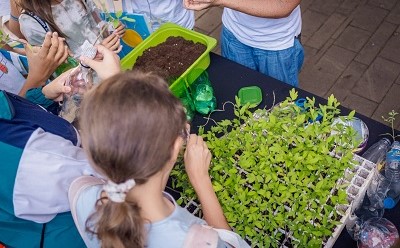- The Santa Cruz City Council, through the Sustainable Santa Cruz Foundation, and Fundación Cepsa have been working together since the beginning of the project
- In its seven editions, 8,209 students have participated in the project
The initiative, which began in 2016, has been established as a proposal that encourages respect for the environment, sustainable consumption and healthy eating among the youngest residents in the city. To date, the program has reached 8,916 students, and it was received brilliantly in the educational community and among families.
The specialized “Peque Huertos” team of monitors has developed a pedagogical strategy through games, stories, riddles and songs, so that the theoretical content of the training is absorbed by the children in a way that is not only didactic, but also fun. Each activity also included a practical component where each student developed a vertical home garden from recycled materials.
The mayor of Santa Cruz, José Manuel Bermúdez, emphasizes that "this initiative implements a pedagogical strategy that aims to teach by playing, with stories, riddles and songs, etc., so that the theoretical content is integrated in a fun and participatory way" and adds that "in addition, with the intention of avoiding inconsistency with family practices, at these young ages, they have been instructed that unhealthy food, that they recognize perfectly, should be consumed in moderation, during a celebration or special day, to avoid prohibiting those foods altogether and making them feel guilty, but with the ultimate intention of helping them to acquire healthy lifestyle habits."
For the head of Fundación Cepsa in the Canary Islands, Belén Machado, "this is an established initiative, so much so that the teachers themselves are the ones who request it every year. The success of the program lies in the satisfaction the schoolchildren show in learning to grow something for the first time in their lives. They choose the seedling, plant it in a structure made from a plastic bottle that they reuse for this purpose, water it and take it home to take care of it and observe its growth, until they can harvest its fruits and prepare healthy food with them. This is also a great learning experience that allows them to appreciate the importance of agriculture and, even more so, of local agriculture.”
For his part, the first deputy mayor and councilor for the Santa Cruz City Council’s Environment Department, Carlos Tarife, points out that "this activity promotes environmental education and ecological awareness, by involving students in the planning, cultivation and care of plants, which gives them the opportunity to understand their life cycle and the importance of biodiversity, while promoting healthy consumption habits." The councilor also states that "the children thus have a practical and enriching experience that goes beyond the traditional classroom content, which makes them pay more attention."
Among the main conclusions drawn from an analysis of this initiative is that, after the activity, the participating students are able to recognize foods native to Tenerife, as well as to value the importance of consuming local products. This is in addition to the training and awareness of the young people in reusing waste materials. The objectives also include the promotion of healthy eating from an early age, which contributes to the prevention of diseases related to poor nutrition.
The children thus have a practical and enriching experience that goes beyond the traditional classroom content, which makes them pay more attention.
This activity promotes environmental education and ecological awareness by involving students in the planning, cultivation and care of plants, giving them the opportunity to understand their life cycle and the importance of biodiversity, while promoting healthy consumption habits.
Once again, canteens were distributed among the participating students in order to reduce the consumption of plastic in schools, as well as to promote environmental awareness in terms of waste through its reduction.

